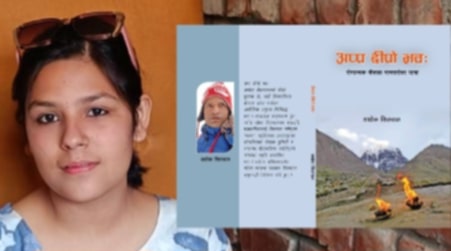
Aditi Silwal
Book Review
Appo Deepo Bhava in three words: Transformative. Authentic. Unforgettable.
Some books you read.
Some books walk beside you.
But this one? This one makes you sit down with yourself in silence.
Ashok Silwal’s Appo Deepo Bhava isn’t a travelogue, it’s a conversation with a close friend. It’s not about reaching enlightenment, and yet, it’s deeply enlightening. It’s a journey full of rawness, cold, questions, laughter, and truth. It’s soul-writing, not travel writing. The kind of book that doesn’t just stay on your shelf, it stays in you.
Silwal’s path to Kailash begins with a missing passport. A few pages gone, and with it; identity, security, the illusion of control. And I felt that loss. Not just intellectually but in my gut. Because that fear? That’s more than missing documents. It’s the fear of disappearing in a place where no one knows your name.
His trek halts at the Nepal–China border; sterile perfection on one side, soft chaos on the other. Towering infrastructure meets tired fences. As a Nepali, that contrast stings. Not with rage, but a quiet ache, the kind you carry when home doesn’t feel proud enough.
And somewhere amid all this, he loses access to Wi-Fi. Suddenly, no posts. No calls. No contact. The hum of the world dims. And in its place rises something old; childhood. That time when connection wasn’t digital but soul deep. He remembers how life used to be. But beneath the sweetness, there was a tremble. A quiet fear.
‘What if something’s happened back home?’
Ohh, that helplessness.
But then, Wai Wai noodles in a Tibetan wilderness, a can of beer, round tables, and North Face jokes. Small things that become sacred. Familiarity in foreignness.
Altitude rises. Breath thins. Silence deepens. But Silwal doesn’t just endure the cold,he listens to it.
And then the line that haunts everyone the most;
“I found Mansarovar inside me. I found Rakshastal inside me.”
Two lakes… one holy, one feared. But both, within us. Because we are both shadow and light.
We love. We fail. We forgive. We sin.
And Ashok doesn’t judge either side, he simply reminds us both are real. Being human might just be choosing which one you water every day.
For him, Kailash wasn’t a goal, it was a quiet calling. He didn’t find Kailash. Kailash found him. And when it did, something shifted. He wanted to return clean; free from smoke, free from alcohol, free from fog within himself. Sudharkendra or Shangrila? Maybe both.
Through every border delay, every breathless morning, every fear, every giggle- he kept walking. His journey is not ego-led. It’s soul-called.
And above it all, the title: Appo Deepo Bhava.
Be a light unto yourself.
Words I have heard before, but never felt like this.
Because Ashok didn’t preach it. He lived it.
When you close this book, Kailash isn’t a place on a map.
It’s the quiet inside you.
And as I turned the last page, I didn’t feel like I had visited Kailash. I felt like Kailash had quietly visited me.